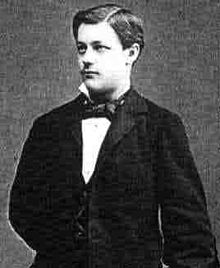Paul Stäckel

Paul Gustav Samuel Stäckel (20 August 1862, Berlin – 12 December 1919, Heidelberg) was a German mathematician, active in the areas of differential geometry, number theory, and non-Euclidean geometry. In the area of prime number theory, he used the term twin prime (in its German form, "Primzahlzwilling") for the first time.[1][2]
After passing his Abitur in 1880 he studied mathematics and physics at the University of Berlin, but also listened to lectures on philosophy, psychology, education, and history. A year later he qualified for teaching in higher education and then taught at Gymnasien in Berlin. In 1885 he wrote his doctoral dissertation under Leopold Kronecker and Karl Weierstraß. In 1891 he completed his Habilitation at the University of Halle. Later he worked as a professor at the University of Königsberg (außerordentlicher Professor from 1895 to 1897), the University of Kiel (ordentlicher Professor, 1897 to 1905), University of Hannover (1905 to 1908), the Karlsruhe Institute of Technology (1908 to 1913), and the University of Heidelberg (1913 to 1919).
Stäckel worked on both mathematics and the history of mathematics. He edited the letters exchanged between Carl Friedrich Gauss and Wolfgang Bolyai, made contributions to editions of the collected works of Euler and Gauss (for whose works he wrote Gauss als Geometer), and edited the Geometrischen Untersuchungen by Wolfgang and Johann Bolyai (published in 1913). Additionally he translated works of Jacob Bernoulli, Johann Bernoulli, Augustin Louis Cauchy, Leonhard Euler, Joseph-Louis Lagrange, Adrien-Marie Legendre, Carl Gustav Jacobi from French and Latin into German for the series Ostwalds Klassiker der exakten Wissenschaften.
In 1904 he was an invited speaker at the International Congress of Mathematicians in Heidelberg.[3] In 1905 he was the president of the Deutsche Mathematiker-Vereinigung. His doctoral students include Paul Riebesell.
Works
[edit]- Über die Bewegung eines Punktes auf einer Fläche, 1885, Dissertation
- Die Integration der Hamilton-Jacobischen Differentialgleichung mittelst Separation der Variablen, 1891, Habilitation
- Elementare Dynamik der mathematischen Wissenschaft in: Encyclopädie der mathematischen Wissenschaft IV,1 (1908)
- several papers in the Mathematischen Annalen (from 1890 to 1909)
- numerous papers in "Nachrichten von der Gesellschaft der Wissenschaften zu Göttingen, Mathematisch-Physikalische Klasse" from 1896 to 1917.
- with Friedrich Engel: Theorie der Parallellinien von Euklid bis auf Gauss, 1895
References
[edit]- ^ Tietze, Heinrich (1949). Gelöste und ungelöste mathematische Probleme aus alter und neuer Zeit. Vol. I. Munich: Biederstein Verlag. p. 17. According to Tietze, in reference to the term Primzahlzwillinge (i.e. "prime number twins"), "Der Ausdruck ist wohl von P. Stäckel (1862-1920) geprägt und hat sich seitdem eingebürgert."
- ^ Stäckel, Paul (1916), "Die Darstellung der geraden Zahlen als Summen von zwei Primzahlen" (PDF), Sitzungsberichte der Heidelberger Akademie der Wissenschaften, Mathematisch-naturwissenschaftliche Klasse (in German), 7A (10): 1–47. See in particular p. 22: "Brun nennt solche Paare von Primzahlen einfach Primzahlpaare. Dieses Wort wird jedoch zu oft in anderer Bedeutung gebraucht – handelt es sich doch beim Goldbachschen Satze selbst auch um gewisse Primzahlpaare – als dass es jenem besonderen Zweck dienen könnte, und ich were daher Paare von Primzahlen, die sich um zwei unterscheiden, Primzahlzwillinge nennen."
- ^ "Über die Notwendigkeit regelmäßiger Vorlesungen über elementare Mathematik an den Universitäten von P. Stäckel". Verhandlungen des dritten internationalen Mathematiker-Kongresses in Heidelberg von 8. bis 13. August 1904. Leipzig: B. G. Teubner. 1905. pp. 608–614.
External links
[edit]- O'Connor, John J.; Robertson, Edmund F., "Paul Stäckel", MacTutor History of Mathematics Archive, University of St Andrews
- Paul Stäckel at the Mathematics Genealogy Project
- Literature by and about Paul Stäckel in the German National Library catalogue
- http://geb.uni-giessen.de/geb/volltexte/2005/2127/ Briefnachlass von Paul Stäckel im Nachlass von Friedrich Engel
- 1862 births
- 1919 deaths
- 19th-century German mathematicians
- 20th-century German mathematicians
- German historians of mathematics
- Differential geometers
- German number theorists
- University of Halle alumni
- Academic staff of the University of Kiel
- Academic staff of the University of Hanover
- Academic staff of Heidelberg University
- Academic staff of the Karlsruhe Institute of Technology
